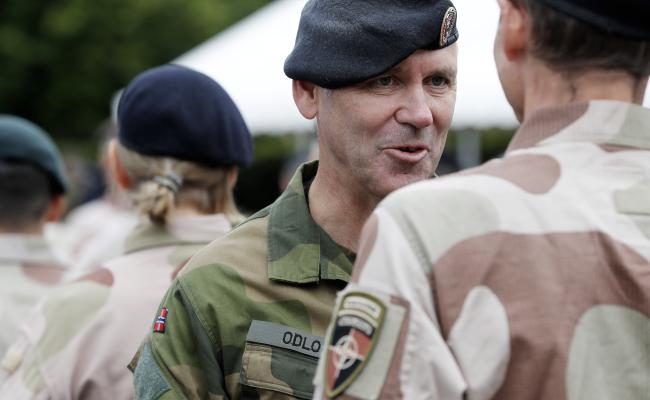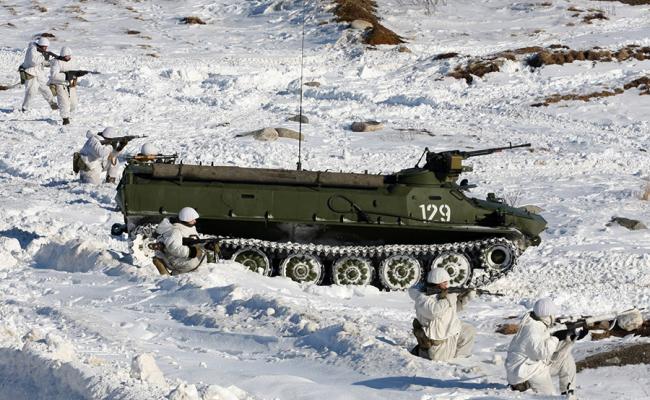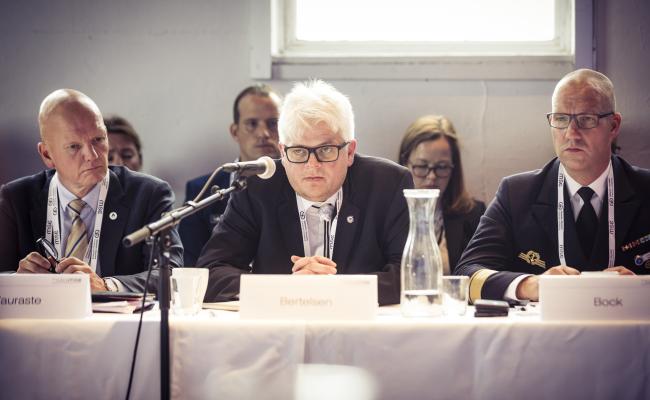Op-ed: Dnipro is Putin’s Rubicon: A Norwegian Perspective
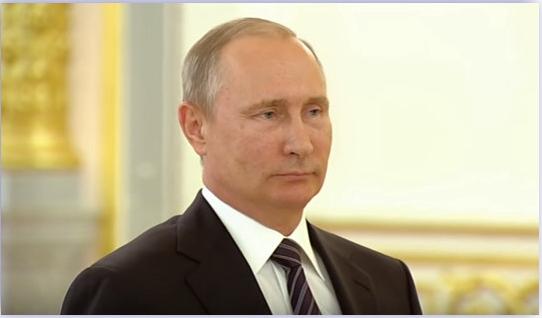
Russian President Vladimir has put himself and his position at risk through his launching a war in Ukraine, Lars Rowe argues. (Photo: Andreas Klamm, Flickr.com)
Putin has, utterly through his own actions, insisted on becoming a global problem and the dictator has, through remorseless violence in a senseless war, prepared his own downfall, argues Lars Rowe, PhD and Norwegian historian of Soviet and Russian history.
This is a debate article, written by an external contributor. The article expresses the writer's opinions. High North News is not responsible for the content in external links.
Discussions about Vladimir Putin’s motivation for attempting to brutally subjugate Ukraine, and what to do about it, are now running high in Norway. There are two main positions, in broad terms:
- Vladimir Putin not only perceives a threat from the eastward expanding NATO, but this perception constituted his actual and fundamental motivation for invading Ukraine. Therefore, he could conceivably have been appeased by Western concessions, and perhaps can be still.
- Vladimir Putin has, through recent events, demonstrated that he is an autocratic leader with expansionistic goals. He is a destructive force in Europe and globally, and his tyrannic rule must be stopped. Failing to act assertively now – however costly that might turn out to be – will be ruinous to the liberal world order and likely even more costly in the long run.
The debate is intense. This is not because it has any immediate bearing on Norwegian policy making. Consensus, both among politicians and academics, leans heavily towards the latter interpretation, and Norway’s position reflects this: The Labour-led government recently decided to break with a 60-year long practice of not supplying actively warring parties with weaponry.
A load of 2000 lightweight anti-armour weapons (M 72s) have reportedly reached the Ukrainian border.
Clinging to the notion that the Putin regime might be reasoned with, despite recent events, seems both naïve and irresponsible. Putin has cast his die, crossed his Rubicon. There is no retreat from the position he has put himself in. While it is paramount that Western democracies stay united with Ukraine in the coming struggle, the key to end this misery lies with the Russian people.
Clinging to the notion that the Putin regime might be reasoned with, despite recent events, seems both naïve and irresponsible.
Since the mid-2000s, Vladimir Putin has given us ample opportunities to determine the true nature of his corrupt fascist regime. He has routinely ignored or abolished fundamental democratic rights. He has established autocratic control of Russian politics, and kleptocratic control of the Russian economy.
He has repeatedly broken international law. Former Soviet republics have been subjugated and brought back into the fold. He has annexed the Crimean Peninsula and supported so-called pro-Russian separatists in Eastern Ukraine. He has by non-military means, both in the East and the West , unlawfully swayed political processes, such as democratic elections. He has ordered killings of political foes, both on Russian soil and abroad.
For the past twenty-or-so years, Western countries have reacted to Putin’s shenanigans with half-hearted scolding.
With the invasion of Ukraine, and by intimating that the nuclear option is on the table, Putin has made sure that the game is irreversibly changed. He has in no uncertain terms demonstrated that his regime amounts to no less than an existential threat against the liberal world order that has been painstakingly organised since the Second World War.
We can no longer dismiss Putin and his henchmen as regional troublemakers with the unfortunate habit of harassing Russian and other post-Soviet underlings. Putin has, utterly through his own actions, insisted on becoming a global problem. The only conceivable solution to this problem, and I think this is pivotal, is his removal from power. If he stays in the Kremlin, we all lose.
These basic insights should inform not only Western policies, but also the Ukrainian leadership’s approach to Russia. Wolodymyr Zelenskyi is now in extreme peril, but also in a position of extreme moral strength. His bully opponent is under increasing pressure – politically, morally, militarily, and not least economically.
Putin has, utterly through his own actions, insisted on becoming a global problem.
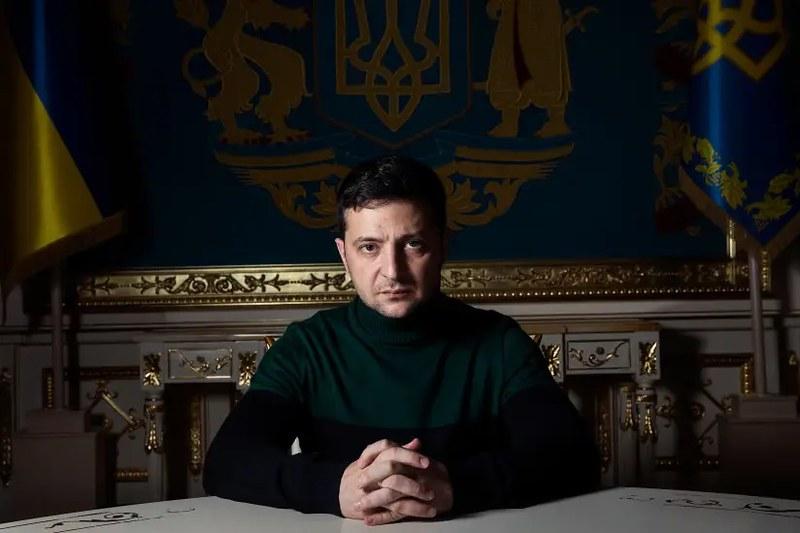
Ukrainian President Volodymyr Zelensky has led his country's fight against the Russian attack. (Photo: bswise/Flickr.com)
The Ukrainian leadership can, boosted by its moral superiority and in full compliance with international law, demand an unconditional Russian retreat from the Ukrainian mainland. But they can opt to go even further and demand the unthinkable: That Russia leaves its naval bases on Crimea and restores the peninsula to Ukraine.
None of these demands have any chance of being met. To Putin, the humiliation of leaving the Crimean Peninsula would probably be tantamount to conceding all power. But that is neither the point here, nor is it the problem of the Ukrainian leadership. Why shouldn’t Ukraine pose these unrealistic, though still perfectly justifiable demands? Why should they not expose and ridicule the unsustainable Russian position? What have they got to lose?
Whatever their strategy, they will still be staring down the barrel of a Russian gun.
But the courageous Ukrainians are not the only ones with a huge job to do. An almost equally formidable task lies before the Russian people.
Vladimir Putin is surrounded by circles of countless fellow travellers who are deeply invested in his continued position of power. They have also crossed the Rubicon, in their own fashion. It is very hard to see anyone who would have the conviction and strength needed to break rank and challenge the omnipotent alfa male. For that, they are too sullied and corrupt.
But – is the Russian population at large tainted in the same way? It has, since substantial uprisings in 2012, following fraudulent elections, quietly watched Putin’s continued and abusive power trip reach new heights. The few but important exceptions – individuals who have desperately raised their voices with little or no regard for their personal safety – have all been dispatched amidst relative silence.
In a sense, the fate of the Russian populace is reminiscent of the collective German shame after allowing Adolf Hitler’s atrocities unfold over twelve fateful and fatal years.
Vladimir Putin is surrounded by circles of countless fellow travellers who are deeply invested in his continued position of power.
But – as the Germans, the Russian people can rise above the depraved leader. Even dictatorial power needs a critical minimum of political support. Only the Russian people can provide Putin with this. Consequently, only they can deprive him of the legitimacy he so craves, and thereby deny him the opportunity to continue his abusive practices.
The sanctions that have been put in place by Western governments will over time create a revolutionary environment in Moscow. Historically, Russian rebellion is closely tied to material deprivation. The revolution in 1905 and both uprisings in 1917 came as Russia was severely weakened by unpopular wars.
As with the collapse of the Soviet Union in December 1991, all these regime shifts were precipitated by long periods of harsh economic conditions. When the bread is gone, or unacceptably dear, the masses rise.
And the rebellion has always been centred on the capital. Today, that is Moscow, with an official population of 12 million increasingly dissatisfied citizens. Should a tenth of them – more than one million individuals – decide to take to the streets in sustained protest, the current despot’s days are counted.
It is therefore crucial that the Western sanctions are upheld, irrespective of the development of the war in Ukraine. Nothing – not even peace – can justify loosening the vice on this Russian regime. Only a firm and long-lasting alliance of the Ukrainian people, Western governments and an increasingly action oriented (and hopefully democratic minded) Russian opposition will be sufficient.
The sanctions that have been put in place by Western governments will over time create a revolutionary environment in Moscow.
We now know that this journey is stained in Ukrainian blood. That might well be the case for the Russian people as well: The despot will not freely relinquish his powers. Should the Kremlin autocrat lose what little is left of his mental faculties, Western people might also become more closely acquainted with his wrath, whatever form that may take.
But the alternative – to allow Vladimir Putin’s world view to be the organising principle of international relations – is truly unthinkable.
The dictator has, through remorseless violence in a senseless war, prepared his own downfall. He has, in his paranoid isolation surrounded himself with trembling and spineless advisors and overestimated his own power and position. The consequences are dreadful, and will become worse, but his dictatorial confusion has drastically expanded the manoeuvring room for democratic forces. This room must be exploited to the fullest.
Lars Rowe, PhD, is a Norwegian historian of Soviet and Russian history. His latest publications are "Industry, War and Stalin’s Battle for Resources and Pollution" and "Atmosphere in Post-Soviet Russia", both 2021 on I. B. Tauris. Rowe is Director of Norway’s Resistance Museum.


